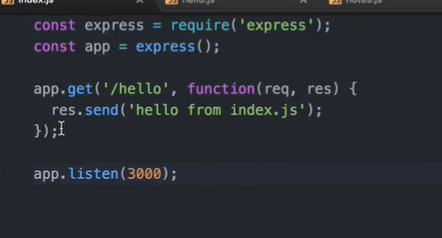Express is a popular web application framework for Node.js that provides a robust set of features and tools for building web applications and APIs. It is widely used because of its simplicity and flexibility.
Some of the key benefits of using Express in Node.js include:
Routing: Express provides a simple and powerful routing system that allows you to easily define and handle different HTTP requests to your application.
Middleware: Express allows you to use middleware to handle tasks such as parsing request bodies, logging, authentication, and more.
Templating engines: Express supports a variety of templating engines, such as EJS, Pug, and Handlebars, making it easy to generate dynamic HTML pages.
Error handling: Express provides a comprehensive error-handling mechanism that allows you to handle errors gracefully and respond to clients with appropriate error messages.
Database integration: Express can easily integrate with databases, making it easy to build database-driven applications and APIs.
Here is an example of a simple Express application that listens for HTTP requests on port 3000:
const express = require('express');
const app = express();
app.get('/', (req, res) => {
res.send('Hello, World!');
});
app.listen(3000, () => {
console.log('Server listening on port 3000');
});
output
In this example, we require the express module and create an instance of the express application. We define a route for the root path (/) using the app.get() method, which sends the string 'Hello, World!' as the response to the client. Finally, we start the server using the app.listen() method, which listens for HTTP requests on port 3000 and logs a message to the console when the server starts.
we use express in node js to retrive data from mongodb
Express is a popular web framework for Node.js that provides a set of tools and utilities for building web applications. One of the main reasons for using Express in Node.js to retrieve data from MongoDB is that it makes it easier to handle HTTP requests and responses. Here are some examples of how Express can be used to retrieve data from MongoDB:
Routing: Express provides a simple and intuitive way to define routes for different endpoints of an API. This allows you to easily map incoming HTTP requests to the appropriate MongoDB queries and return the results to the client.
Middleware: Express middleware functions are functions that can be added to the request-response cycle of an application to perform various tasks such as handling errors, logging, authentication, and more. This can be useful for handling incoming requests and processing the data before querying the MongoDB database.
Templating engines: Express also supports a variety of templating engines such as Handlebars, EJS, and Pug, which can be used to render HTML templates with data retrieved from MongoDB.
Here is an example of how to use Express to retrieve data from MongoDB:
const express = require('express');
const app = express();
const MongoClient = require('mongodb').MongoClient;
const url = 'mongodb://localhost:27017/mydb';
// Connect to MongoDB
MongoClient.connect(url, (err, db) => {
if (err) throw err;
console.log('Connected to MongoDB');
// Define a route to retrieve data from MongoDB
app.get('/users', (req, res) => {
const collection = db.collection('users');
collection.find().toArray((err, result) => {
if (err) throw err;
res.send(result);
});
});
// Start the server
app.listen(3000, () => {
console.log('Server started on port 3000');
});
});
In this example, we are using Express to define a route to retrieve data from a MongoDB collection named "users". The find() method is used to retrieve all documents from the collection, and the results are sent back to the client in the HTTP response. This is just a simple example, but with Express, you can easily add more routes and middleware to handle more complex data retrieval scenarios.


Top comments (0)